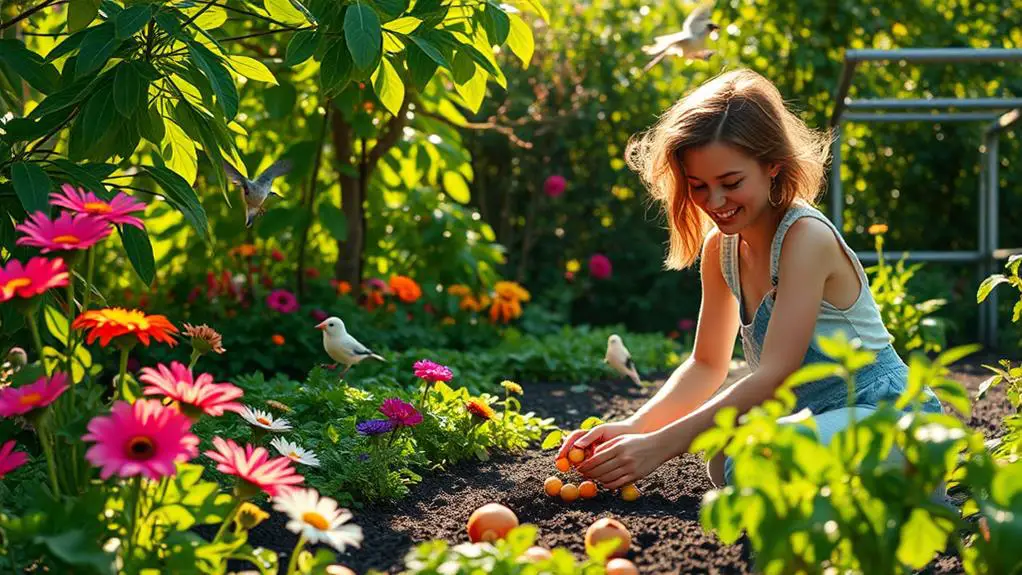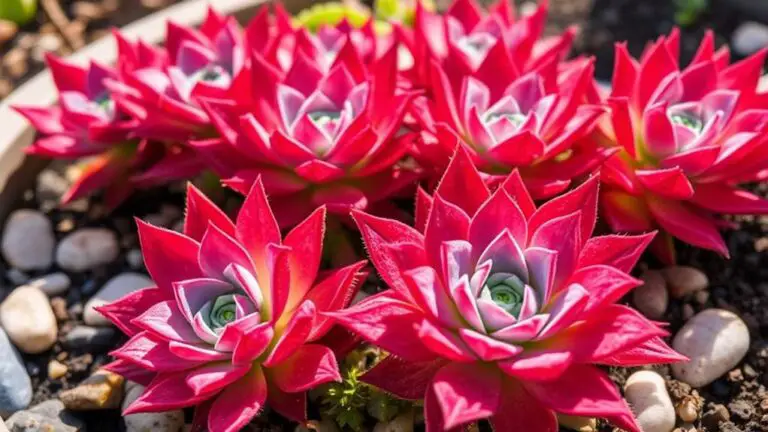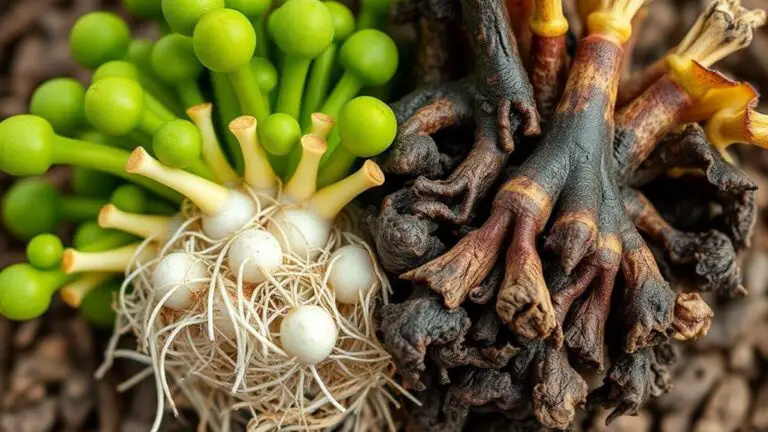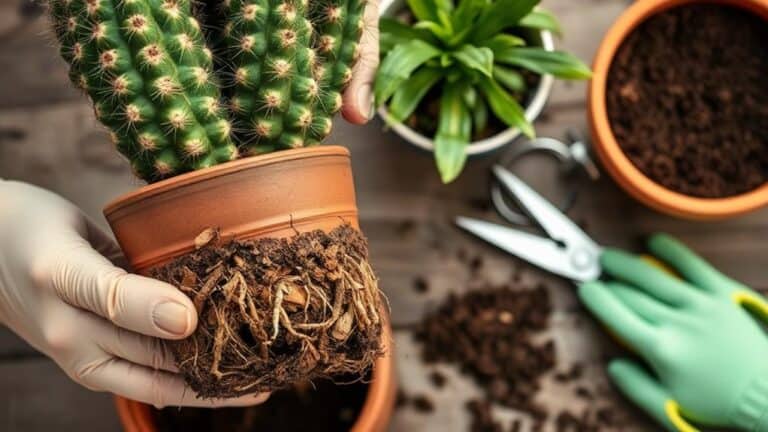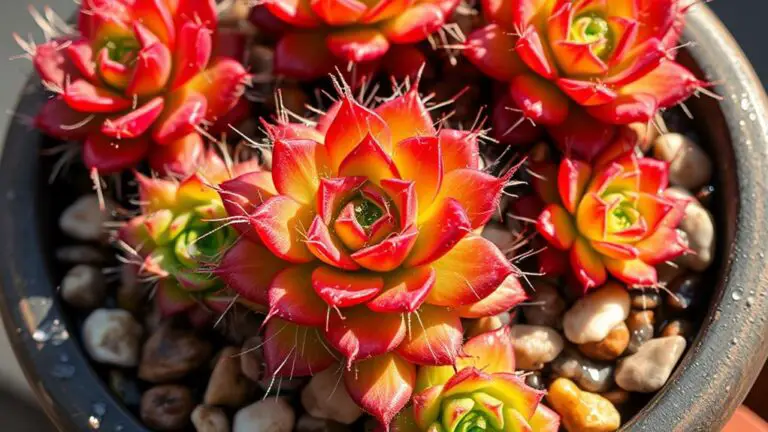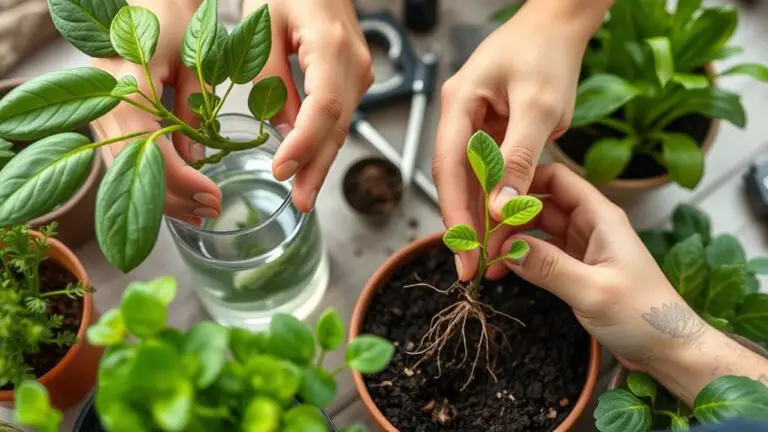7 Reasons Gardening Is Great for Your Health
You might not realize it, but gardening offers a surprising number of health benefits that go beyond just having a beautiful yard. From providing a moderate workout to boosting your immune system, there are compelling reasons to start digging in the dirt. Imagine reducing stress while growing your own vegetables or improving your cardiovascular health without setting foot in a gym. Curious how these activities can impact your well-being even further? Let's explore how this simple hobby can transform your health in seven distinct ways.
Physical Exercise
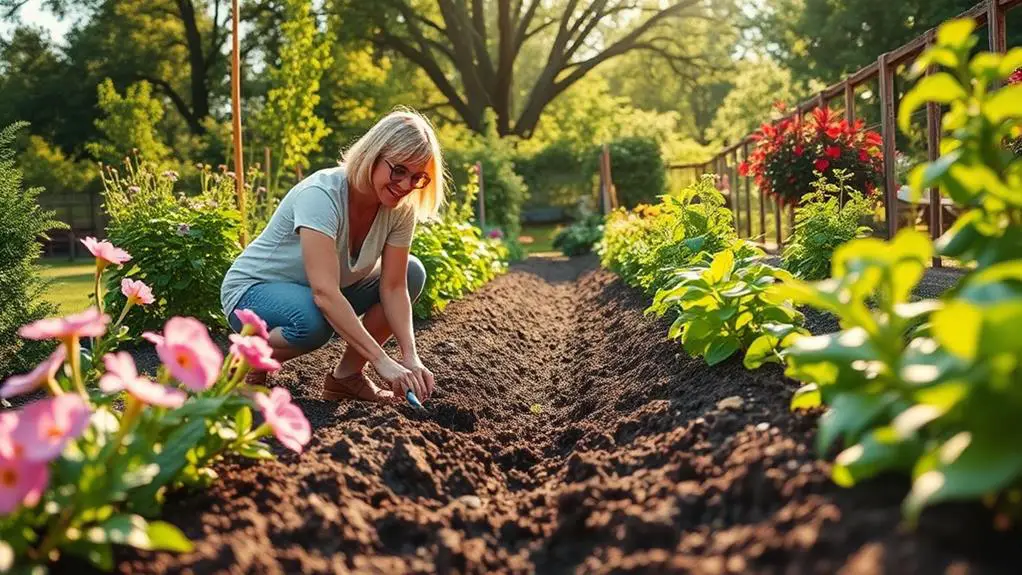
Engaging in gardening is a fantastic way to incorporate moderate-intensity exercise into your routine. When you spend time weeding, digging, and raking, you're not only making your garden look beautiful but also giving your body a great workout.
These activities engage large muscle groups, helping to improve your overall strength and flexibility. Plus, just an hour of light gardening can burn around 330 calories, which is more than walking at a moderate pace for the same time.
Regular gardening can also boost your overall physical activity levels. A study found that people who participate in community gardens get nearly six extra minutes of moderate-to-vigorous activity each day.
That's about 42 extra minutes per week! This increased physical activity is one of the key benefits of gardening, contributing to long-term cardiovascular health and helping to regulate blood pressure.
Mental Health

While gardening offers substantial physical benefits, its positive impact on mental health is equally compelling. Engaging in gardening activities has been linked to a reduction in depression and anxiety symptoms. Studies show that spending time with plants and nature can markedly enhance your overall mental well-being.
Therapeutic horticulture, or gardening as a form of therapy, promotes a hopeful outlook on life. A meta-analysis published in Preventive Medicine Reports (2017) confirmed that gardening effectively alleviates mental health issues. When you garden, you create a sense of accomplishment. Watching plants grow under your care provides structure and purpose, and this can lead to an improved mood and greater satisfaction.
Moreover, time spent in green spaces while gardening can lower your heart rate and promote a calming effect on your mental health. This natural form of stress relief can help you feel more relaxed and at peace.
Regular gardening can also enhance social connections. Whether you join a community garden or simply share gardening tips with neighbors, these interactions strengthen social ties, reducing the risks of depression and anxiety.
Stress Reduction
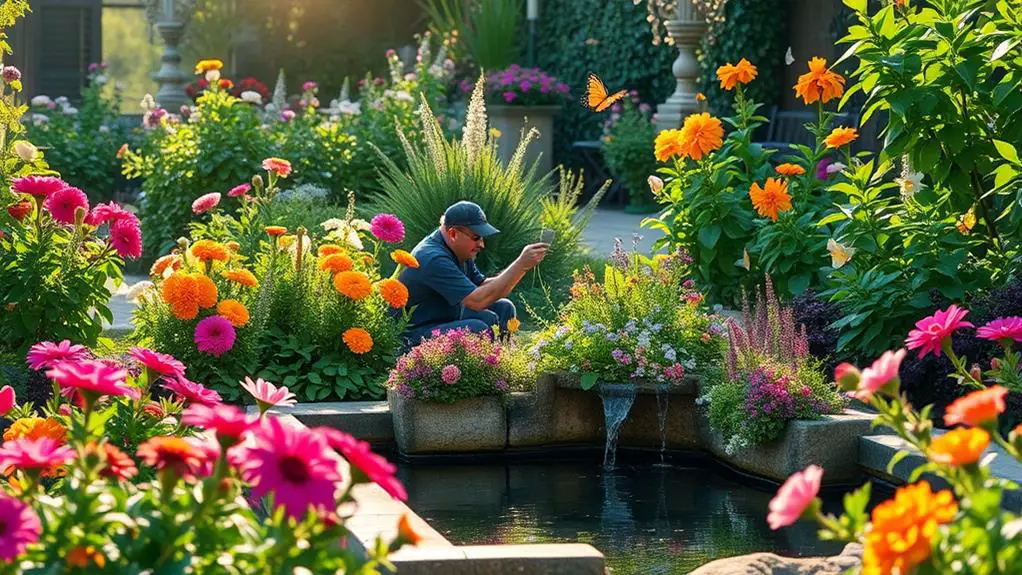
Gardening can be an amazing way to reduce stress because it combines therapeutic outdoor activity, routine, and mindfulness.
When you care for your plants and follow a regular gardening schedule, you can focus on positive tasks and feel a sense of accomplishment.
Plus, spending time in nature has calming effects that can help lower your heart rate and relax your muscles.
Therapeutic Outdoor Activity
When you step into your garden, you're not just tending to plants; you're also tending to your mental health. Gardening offers numerous health benefits, one of which is stress reduction. Engaging in gardening tasks serves as a form of moderate-intensity exercise, which can help alleviate stress by lowering symptoms of anxiety and depression. Physical activity alone can do wonders for your mood and mental clarity.
Time spent in green spaces while gardening has been shown to reduce heart rate and muscle tension. This contributes to a more relaxed state of mind. When you focus on nurturing your plants, you also create a routine that distracts you from negative thoughts. This focus can promote mental clarity and a sense of calm.
The act of nurturing plants fosters a sense of accomplishment and satisfaction. This can enhance your overall mood and reduce feelings of stress.
Additionally, exposure to soil and nature, including beneficial microbes, has been linked to increased serotonin levels. This further promotes emotional well-being and reduces stress.
Routine and Mindfulness
Often, engaging in a structured routine like gardening can greatly enhance your mental health. By providing a clear set of tasks, gardening helps you establish a sense of purpose and accomplishment. This is especially beneficial if you're dealing with anxiety or depression. The regular act of tending to your plants can give you something to look forward to each day, creating a positive, predictable rhythm.
Gardening also reduces stress and anxiety by promoting mindfulness. When you're focused on activities like weeding or planting, you're less likely to dwell on negative thoughts. Instead, you become immersed in the present moment. This shift in focus can act as a powerful distraction from everyday worries.
Studies have shown that spending time in green spaces, including your garden, lowers cortisol levels, the hormone associated with stress.
Nurturing plants and watching them grow fosters a sense of connection and hope. This can greatly improve your mood and overall outlook on life. The therapeutic and calming nature of gardening provides ample opportunities for reflection and problem-solving, further aiding in stress relief.
Nature's Calming Effects
Among the many benefits of gardening, its ability to reduce stress stands out. When you're feeling overwhelmed, spending time in your garden can help calm your mind. Gardening has been shown to lower symptoms of anxiety and depression, giving you a positive impact on your overall health. Engaging with plants can enhance your mood and make you feel more fulfilled.
Being in green spaces, like gardens, naturally leads to reduced stress. The calming environment encourages relaxation, helping you unwind. When you're focused on gardening tasks, it distracts you from negative thoughts and lets you live in the present moment. This can act as a natural stress reliever.
Watching plants grow and go through their life cycles fosters positivity. It gives you a sense of purpose, which can help alleviate feelings of stress and anxiety.
Plus, engaging with soil and nature releases serotonin, a neurotransmitter that makes you feel happy and boosts well-being.
Healthy Eating
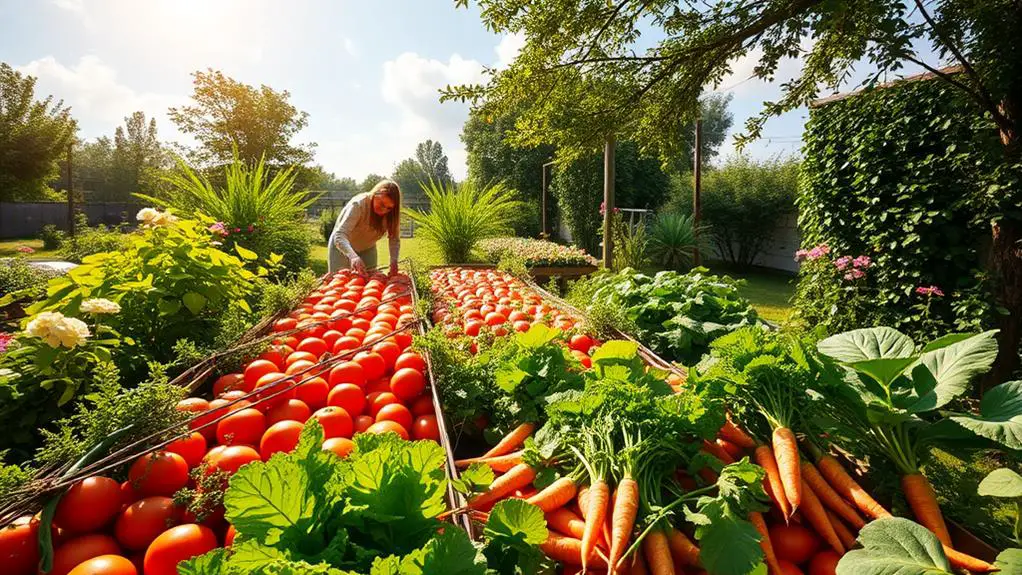
Gardening offers a direct path to healthier eating by giving you the opportunity to grow your own fresh fruits and vegetables. When you cultivate your own garden, you can enjoy the benefit of gardening by having access to produce that's free from pesticides and packed with essential nutrients. Growing your own fruits and vegetables promotes healthy eating habits, making it easier for you to meet dietary guidelines of 2 cups of vegetables and 1.5 cups of fruits daily.
| Vegetable | Vitamin | Health Benefit |
|---|---|---|
| Tomatoes | Vitamin C | Boosts immune system |
| Peppers | Vitamin A | Supports eye health |
| Spinach | Iron | Improves blood health |
| Carrots | Beta-carotene | Promotes vision health |
Immune Boost
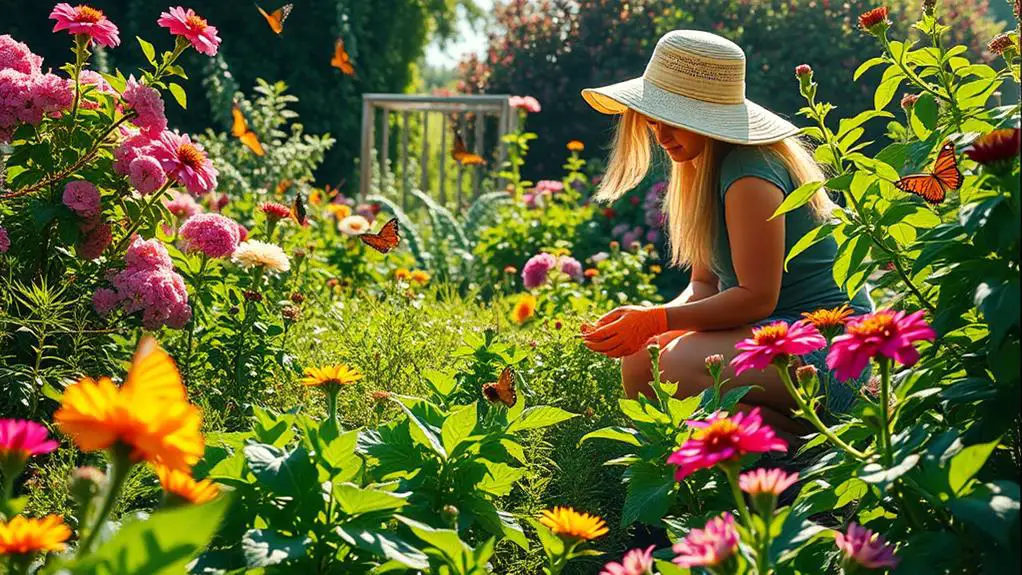
Engaging in gardening can greatly boost your immune system in multiple ways. When you dig into the soil, you're not just planting seeds; you're also exposing yourself to beneficial microbes. These soil microbes can help enhance your immune system, making it better at fighting off pathogens.
Sunshine is another big plus. When you're out in the garden, you're soaking up vitamin D from the sun. Vitamin D is essential for calcium absorption and plays an important role in keeping your immune system strong. Just a bit of time in the sun can make a big difference in your health and wellness.
Gardening isn't just about standing around; it involves physical activity. This regular movement strengthens your cardiovascular system, improving circulation and boosting your immune response.
Plus, spending time with your plants can lower your stress levels. Lower stress means better immune function and greater resilience against illnesses.
Social Connections
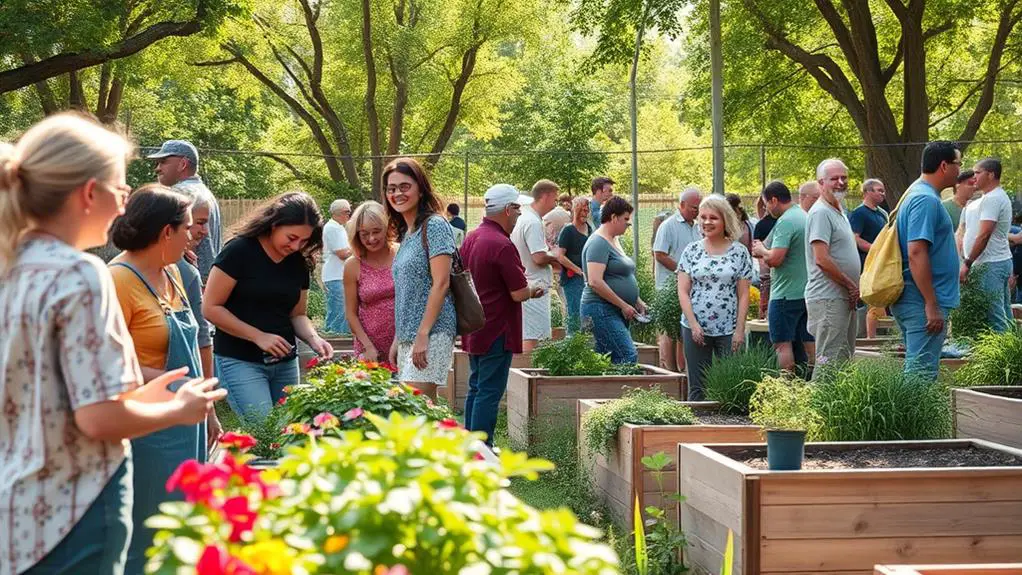
In addition to boosting your immune system, gardening offers fantastic social connections.
Working in a community garden helps you make new friends and work together toward common goals.
These shared experiences can bring people closer, improve mood, and even reduce feelings of depression and anxiety.
Community Bonding Opportunities
Community gardens serve as vibrant hubs that unite diverse individuals, fostering social interaction and collaboration. When you participate in a community garden, you're not just growing plants; you're also cultivating relationships. These shared spaces bring together people from various backgrounds, all working towards common goals. This collaboration promotes physical and mental health, which is vital for overall public health.
By engaging in a community garden, you can boost your self-esteem and mood. Gardening alongside others creates a sense of camaraderie, helping you feel more connected and less isolated. This social interaction is essential for mental well-being, providing you with a support network within your neighborhood.
Volunteering in community gardens also strengthens social networks. When you work together to address local food insecurity, you're participating in collective action that benefits everyone. This teamwork enhances a sense of belonging and reinforces community ties.
Gardening with family and neighbors fosters teamwork and cooperation, bringing you closer together. These bonding opportunities are invaluable for creating lasting friendships and strong neighborhood connections.
Ultimately, being part of a community garden not only enriches your life but also contributes positively to your community's physical and mental health.
Shared Gardening Experiences
Participating in shared gardening experiences strengthens social connections and fosters a sense of community. When you work alongside others in a community garden, you're engaging with people from different backgrounds, which helps build strong social ties and encourages collaboration.
These gardens aren't just about growing plants; they're about growing relationships too.
Research shows that gardening together can enhance your mental health. Allotment gardeners often report feeling a sense of belonging, which can reduce feelings of isolation. As you share the joys and challenges of gardening, you'll find your mood and self-esteem improving.
It's amazing how a bit of dirt under your nails can connect you with others and lift your spirits.
Social connections formed through gardening activities can also lower the risk of depression and anxiety. When you participate in group gardening initiatives, like workshops or volunteer events, you're not just learning new skills; you're also making friends and building a support network.
These shared experiences create a sense of camaraderie and make you feel more connected to your community. So, grab your gloves and join in—gardening isn't just good for your plants; it's great for your soul too.
Environmental Impact
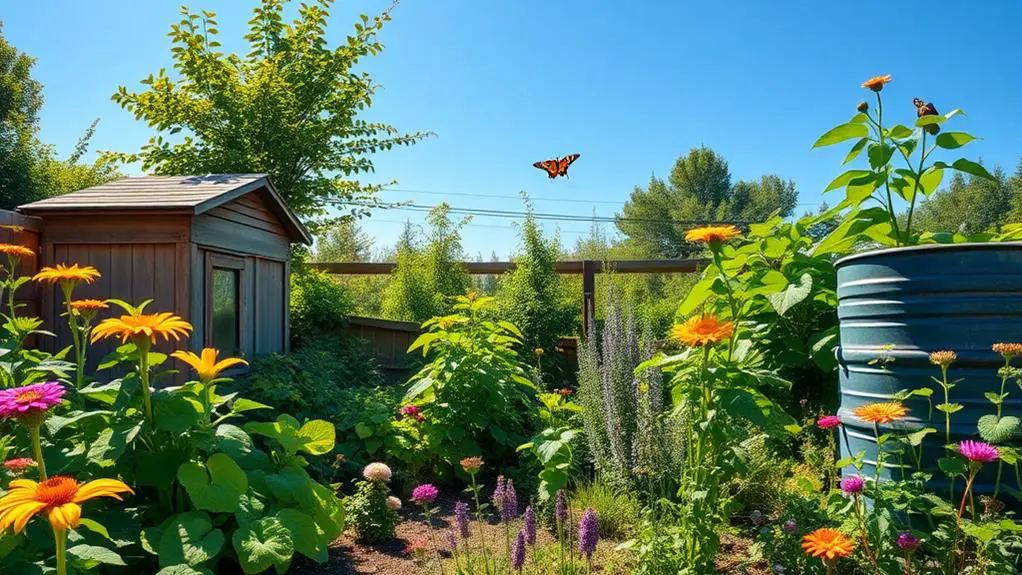
Gardening doesn't just beautify your surroundings; it also yields significant environmental benefits. By engaging in gardening, you contribute to a healthier planet in several ways. Here are some key impacts:
- Biodiversity: Gardening enhances biodiversity by creating habitats for various plants and animals. This supports ecosystem health and resilience, making your garden a small but essential part of the larger environmental network.
- Air Quality: Plants play a critical role in improving air quality. They absorb carbon dioxide and release oxygen, which helps to mitigate urban air pollution. Your garden can act as a natural air purifier, making the air around you cleaner and fresher.
- Environmental Balance: Sustainable gardening practices promote healthy soil, reduce erosion, and enhance water retention. These actions are important for maintaining environmental balance. Properly managed gardens can absorb rainwater, reducing runoff and preventing flooding in urban areas.
Moreover, urban gardening can reduce the heat island effect, leading to cooler temperatures and more comfortable living conditions during hot weather.
Frequently Asked Questions
How Does Gardening Improve Your Health?
Gardening improves your health by providing moderate exercise, reducing anxiety and depression, boosting your immune system, and increasing vitamin D levels. Plus, growing your own produce encourages healthier eating habits and fosters social interactions for emotional well-being.
Why Does Gardening Make You Feel Good?
Gardening makes you feel good because it boosts serotonin levels, reduces stress, and provides a sense of purpose. You engage with nature, which lowers anxiety and depression, and enjoy the rewarding experience of nurturing and seeing plants grow.
Do Gardeners Live Longer?
Yes, gardeners tend to live longer. Engaging in gardening boosts your physical activity, reduces stress, and promotes healthier eating habits. These factors contribute to improved cardiovascular health and mental well-being, leading to a longer, healthier life.
Why Do I Love Gardening so Much?
You love gardening because it combines physical activity, mental relaxation, and social interaction. It offers a sense of accomplishment while providing fresh produce, enhancing your well-being and happiness. Gardening's diverse benefits make it a truly rewarding hobby.
Conclusion
Gardening is a fantastic way to boost your health. You'll get good exercise, feel happier, and lower your stress levels. Plus, you can enjoy fresh, healthy food right from your garden. Your immune system will thank you, and you'll make new friends in the gardening community. By gardening, you also help the environment. So, grab some seeds and start your garden today. You'll be amazed at how much better you'll feel!

